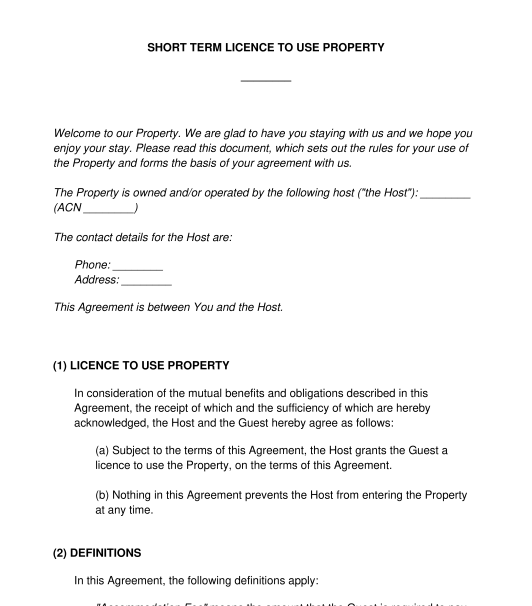 20/11/2025
20/11/2025

Answer a few questions and your document is created automatically.

Your document is ready! You will receive it in Word and PDF formats. You will be able to modify it.

 20/11/2025
20/11/2025
 Word and PDF
Word and PDF
 10 to 14 pages
10 to 14 pages



This is a Short Term Licence to Use Property. It is for use by property owners or property managers who are renting out a property for a short time (such as holiday rentals). It is not for use for long term property rentals.
This document is actually set out as a "licence" rather than a "lease". A lease (also referred to as a residential tenancy agreement) is the normal way that most people rent a property on a long term basis. Many property owners prefer a licence over a lease for short term rentals, for a few reasons.
Firstly, a lease gives the tenant (or guest) the right to exclusive possession of the property. This means they have the right to keep the owner of the property out of the property. This can pose a problem for property owners if, for example, the guest does not leave when they are meant to. A licence, on the other hand, gives the guest the right to access the property during the term of the licence, but the guest cannot prevent the owner from entering the property. This can make it easier to remove the guest at the end of the relevant time period (if the guest does not leave when they are meant to), or in the event that the guest causes problems.
Secondly, leases in Australia usually have to be at least a few months long, which is not appropriate for most holiday rentals.
Thirdly, leases are highly regulated, which can create additional challenges for the property owner. For example, under residential tenancy laws, if the tenant (or guest) does not leave the property when they are meant to, the owner will have to go through the lengthy eviction process under residential tenancy laws, and it could be months before they are able to remove the tenant.
No, it is not mandatory to have a Licence Agreement. A guest could stay at somebody's property without a formal document. However, using a written Licence Agreement is strongly recommended as it can help protect both parties' interests, and can help avoid misunderstandings and disputes.
This is a sum of money paid by the guest to the owner before entering the property. This money may be used to cover any damage to the property that is caused by the guest. If no damage occurs, then the money would be returned to the guest.
This is only intended to be used for short term rentals. In most states and territories of Australia, if a property is rented for more than several months, then the arrangement is likely to be considered a long term lease, which means that residential tenancy laws apply (regardless of whether a residential lease document has actually been used). That would give the guest (or tenant) additional rights such as minimum notice periods for evictions.
Holiday rentals are currently receiving a lot of attention from Australian authorities. Laws vary from one place to the next, and are constantly being updated. Therefore, an important first step for owners or managers of a holiday rental, is to check local laws to ensure that they are in compliance. Local councils are often a good source of information regarding these matters. If in doubt, seek legal advice.
Once the document has been prepared, both parties should sign and date it, and should keep a copy for their own records.
This Agreement should contain all the information and rules required for a guest to undertake a short term rental of the property. This includes:
Leases and licences in Australia are generally subject to the laws of individual states or territories. State laws will cover general contract principles.
The decision in the Victorian Supreme Court of Swan v Uecker (2016) VSC 313 considered the differences between a sub-lease and a licence.
Each state and territory may also have its own legislation which may deal with short term accommodation, including (but not limited to) fair trading legislation, tenancy legislation, planning and development legislation and strata development legislation. In many regions, legislation, regulations and/or codes of conduct for short term rentals are also being developed. Therefore, if the owner or manager of the holiday rental has any concerns about their legal situation with regard to the property, seek legal advice.
In addition, the Australian Consumer Law ("ACL") may apply to the agreement. The ACL provides some protections to consumers, when they are transacting for goods or services from a business. It may not apply to a one off transaction between private parties (for example, between individuals).
For example, it may apply if an individual person hires a holiday rental from a travel company. However, it may not apply if an individual person is just hiring out their beach house.
If the Australian Consumer Law applies, then the host must meet the minimum standards set out in the legislation. Further information about the Australian Consumer Law is available on the Australian Consumer Law website.
If the person preparing this document is unsure whether the Australian Consumer Law applies, they may consider seeking legal advice.
You fill out a form. The document is created before your eyes as you respond to the questions.
At the end, you receive it in Word and PDF formats. You can modify it and reuse it.
A guide to help you: What to do after Preparing a Contract
Holiday Home Terms and Conditions - sample template
Country: Australia